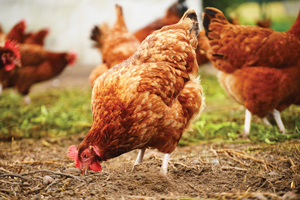What do egg labels mean?
by Charlotte Vallaeys
This article was originally published in May 2015

When buying eggs, animal welfare is an important consideration for most consumers. The welfare and living conditions of laying hens can vary substantially and the labels on the cartons — “cage-free,” “free-range” or “pasture-raised” — will let us know the kind of farm the eggs are from.
At the low end of the spectrum is the caged hen farm, where hundreds of thousands, sometimes millions of hens are crammed into cages, each with less space than an 8-by-11-inch sheet of paper. You won’t find any eggs from caged hens at PCC.
Eggs labeled “cage-free” come from farms that have taken a step in the right direction. Cages aren’t used but hens on “cage-free” farms typically live out their lives indoors, in barns with tens of thousands of other birds. There’s no door to go out at all. When these barns have an outdoor area, it can range from a small enclosed concrete porch to a sizable, vegetated outdoor run, and those eggs may be labeled “free-range.”
Egg labels have an important limitation, however. Third-party verification is not required and there’s no standard definition for what it means to be “free-range.” So a laying hen on a “free-range” farm doesn’t necessarily range freely outdoors. Remember that a small covered concrete porch counts as “outdoors” and there are no requirements for the amount or size of exit doors, or the amount of time they’re kept open each day.
At the top end of the spectrum is the pasture-based farm, labeled “pasture-raised” on the egg carton. In terms of welfare for hens and nutritional quality of the eggs, pasture-based systems with small flocks and careful pasture management are ideal. But like “free-range,” there’s no standard definition for “pasture-raised.”
Third-party labels
Third-party animal welfare labels on egg cartons can play a critical role, but the standards behind third-party labels vary substantially. Understanding each label is essential to support farms with high animal welfare standards.
The third-party certified U.S. Department of Agriculture (USDA) organic label is backed by rigorous federal standards, but they don’t cover animal welfare comprehensively. Organic standards require “year-round access for all animals to the outdoors,” but USDA has not always enforced this and continues to allow eggs from hens that are confined indoors to be sold as “organic.” The USDA organic label on eggs is valuable in many ways — prohibiting synthetic pesticides, genetic engineering and antibiotics in chickens after the first day of life are some of the most important — but it unfortunately doesn’t yet set high standards for animal welfare.
Some other third-party labels aren’t worth much either for ensuring high animal welfare standards. A 2014 Consumer Reports survey found 79 percent of consumers nationwide think a “humanely raised” label should mean the animals went outdoors, but very few animal welfare labels actually require this. The standards behind the American Humane Certified, Food Alliance, and Certified Humane labels prohibit cages but don’t require outdoor access.
Certified Humane
Certified Humane is a label seen on some egg cartons sold at PCC. You may see the Certified Humane label in addition to a “free-range” or “pasture-raised” label, which means the eggs met specific standards.
An egg carton with a “free-range” label and a Certified Humane label means the farm met the Certified Humane standards for “free-range.” These standards require at least 2 square feet per bird of outdoor space. The outdoor area must consist of living vegetation and be managed to prevent damage and contamination. The hens must be given access to the outdoor space at least 6 hours per day, except during inclement weather. One of the obstacles to outdoor access on many “free-range” farms is the shortage or inaccessibility of exit doors. Certified Humane “free-range” standards don’t specify the number or size of doors.
An egg carton with a “pasture-raised” label and a Certified Humane label means the farm met the Certified Humane requirements for pasture-based systems. The minimum outdoor space requirement is 2.5 acres per 1,000 birds, which means approximately 108.9 square feet per bird. Unlike the 2 square feet of the “free-range” standards, this is enough space for the hens to spread out and forage. The standards also require that the pasture be rotated periodically to prevent damage and contamination to the land. Birds must be outdoors 12 months of the year, every day for a minimum of 6 hours per day. The “pasture-raised” standards, unlike the “free-range” standards, specify that hens must have sufficient exit areas appropriately distributed around the house, that are sufficiently big to allow the passage of more than one hen at a time.
Even though the USDA Organic standards require outdoor access, the Certified Humane label on a carton of certified organic eggs doesn’t ensure compliance with its “free-range” or “pasture-raised” standards.
See Exceptional eggs to learn about eggs at PCC.
